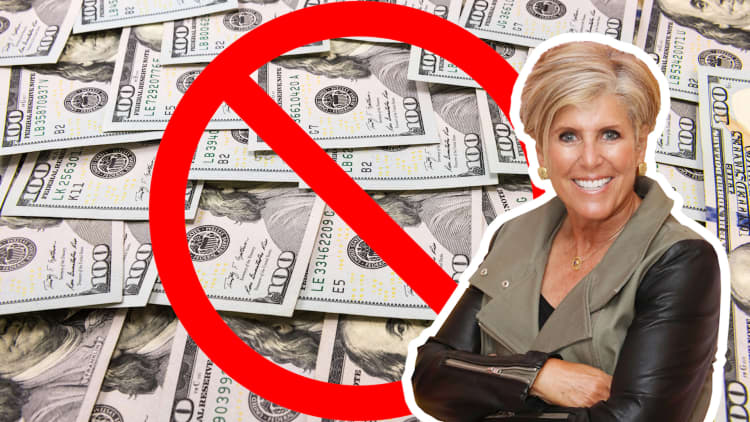Thanks to the record-setting government shutdown, 800,000 federal employees are being asked to work without pay or to stay home, and they're feeling the effects: So far, each has missed more than $5,000 in wages on average, the New York Times reports.
For many cash-strapped workers, it's "an emergency situation," says personal finance expert Suze Orman. That's why she gives them the green light to consider breaking one of her key money rules and borrowing from a retirement account.
On a special episode of her podcast "Women and Money" for federal employees, Orman suggests they consider taking out a loan from their Thrift Savings Plan (TSP) — a retirement account for government workers, similar to a 401(k) or 403(b) — if they can't cover their expenses, even though she ordinarily says retirement savings should be sacrosanct.
"This will be the first time in the history of my entire career that I am telling anyone to even consider this," she says, "but if you don't have the money to pay your bills — if you don't have any way to feed your children — then you might want to consider taking a loan from your retirement account. … And when and hopefully you do get your back pay, you then can pay it back."
Orman usually says that taking a loan from your 401(k) to pay off debt is the "biggest mistake you will ever make" — that's because you could owe taxes and penalties if you don't repay the loan on time, and you could lose out on future earnings that would have accrued on the borrowed money, had it been left in your account.
But desperate times call for desperate measures.
Tony Reardon, president of the National Treasury Employees Union, tells CNBC that the group has heard from hundreds of frantic federal employees. "They're scared," he says. "They don't know how they're going to put food on the table." And the partial government shutdown, which began Dec. 22, could continue to drag on for "months or even years," President Donald Trump said last week, or until he gets the funding for his proposed border wall.
"When you're being held hostage by the U.S. government, you need to know your options," Orman said in an interview with MONEY.
If you don't have the money to pay your bills — if you don't have any way to feed your children — then you might want to consider taking a loan from your retirement account.Suze Orman
Before you dip into your retirement savings, though, it's better to max out your credit cards, Orman says on her podcast. And as soon as the government reopens and you start receiving your regular paycheck, you want to get rid of the balance you've accumulated as fast as possible.
"Do not fall into the trap of, 'Oh, I only have to send in $10,'" says Orman. She's referring to the fact that most credit cards only require you to make a minimum payment each month, which is typically a fixed amount, often $20 to $25, or a percentage of your balance, usually 1 to 3 percent. "You are always to pay more than the minimum payment due."
Another last-resort option is to withdraw any money you may have in a Roth IRA. "You can take out any money you originally put into a Roth IRA without taxes or penalties regardless of how old you are or how long that money has been in there," she says on her podcast. For example, if you have $25,000 in a Roth IRA account — $15,000 of which you contributed and $10,000 that you've earned over time — you can take out your original contributions (the $15,000) without owing taxes and penalties. You just can't touch the gains (the $10,000) until age 59 ½.
You can also withdraw money from your traditional IRA as long as you replace it within 60 days, Orman says: "If you don't replace it, however, anything that you withdrew, assuming that you're under the age of 59 ½, you will have to pay taxes and a penalty on it."

So if you're a federal employee not receiving a paycheck and cannot pay your bills, here are the options to consider, in order:
- Max out your credit card, but commit to paying off your balance in full as soon as you get your back pay and start receiving your regular paycheck again.
- Withdraw money from your Roth IRA if you have one. You can take out the original contributions you made without owing taxes and penalties.
- Take a loan from your TSP. Remember, taking a loan from your retirement account is different than withdrawing from it. If you choose to cash out all or part of your retirement account, you'll owe both state and federal taxes, as well as a 10 percent penalty for withdrawing before you reach age 59 ½.
How to take a loan from your TSP retirement account
If you're eligible to take out a loan from your TSP account, you don't have to pay taxes or a penalty. Instead, you take money directly out of your balance and develop a plan to pay yourself back. The repayment plan for a TSP includes the amount you took out, plus interest, and has a term of one to five years.
To be eligible for a TSP loan, you must have at least $1,000 of your own contributions and earnings in your TSP account (agency contributions and earnings cannot be borrowed). You'll be charged a loan fee of $50 for administrative expenses and must repay your loan with interest. "The interest rate on your TSP loan is the G Fund rate at the time your loan application is processed," the TSP site notes. "This rate is fixed for the life of the loan."
Orman also notes that older workers have more flexibility when it comes to retirement account withdrawals. A rule known as "Rule of 55" says that if you leave your job in the year that you turn 55, you can access any money that you have in a TSP, a 401(k) or 403(b) without owing the 10 percent early withdrawal penalty. "If you're 54 and you're thinking, 'I'm out of here,' and you want to quit, no matter when you turn 55, as long as it's in 2019, you can access any of your money," Orman says. But, she notes, this rule does not apply to IRAs.
How to handle your money in an emergency
Other smart steps to take if you're affected include calling your creditors — for your mortgage, car or credit cards, for example — and telling them you're not getting a paycheck. Ask for an extension, she says: "Because remember, if you are late on your payments, that counts against you for your credit score."
Also, she says, be careful with your spending: "Every single penny has to go for something that you need," which means skipping things like the movies and dining out for now.
"These are ways for you to access money that you may have that you didn't even know," she says, which "hopefully could get you through."
No matter how much you need the cash, though, Orman says, one option should remain off the table. Don't take out a payday loan, she says: "Please don't do it. If you do it, it will be the biggest mistake you have ever made."
Don't miss: Here's how much members of Congress get paid, even during a government shutdown
Like this story? Subscribe to CNBC Make It on YouTube!



